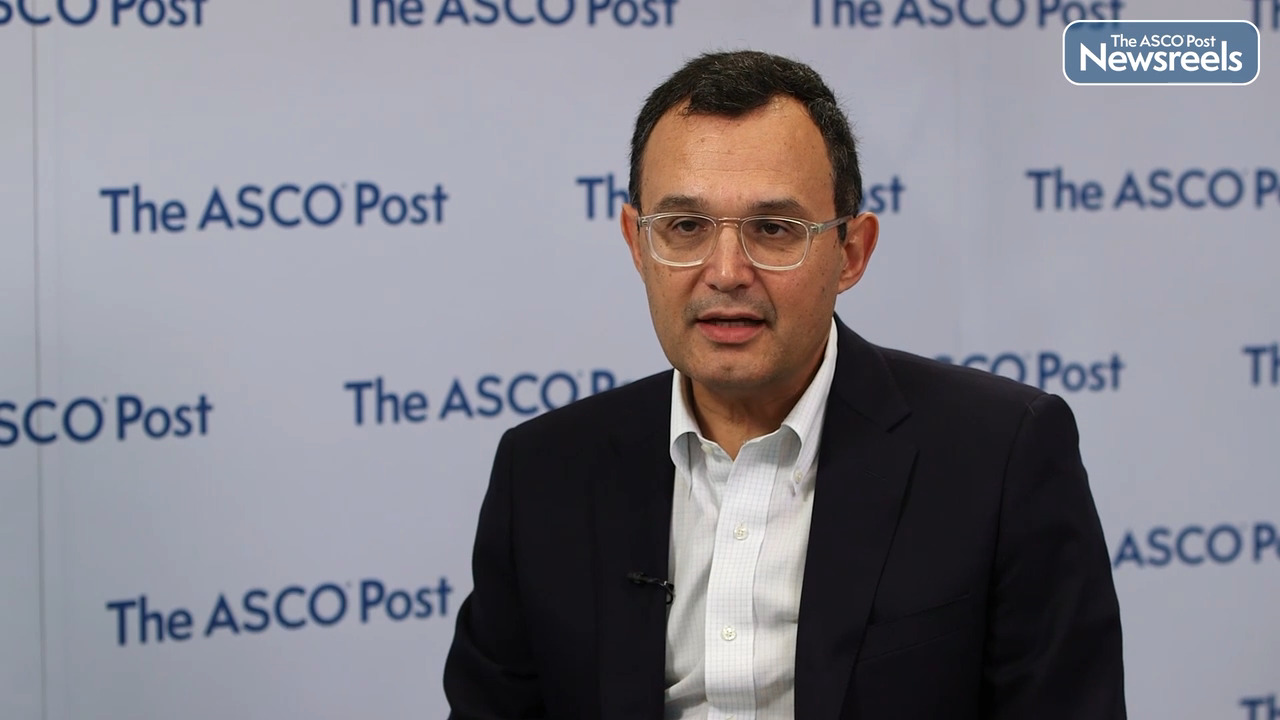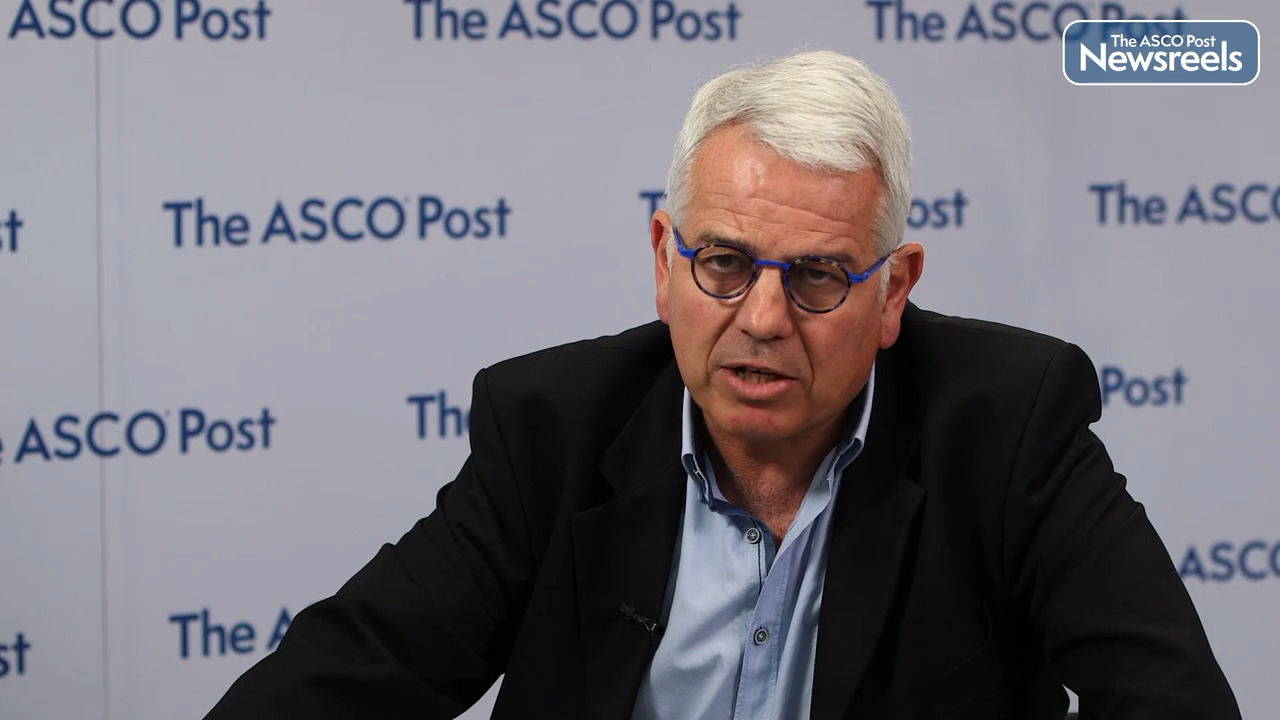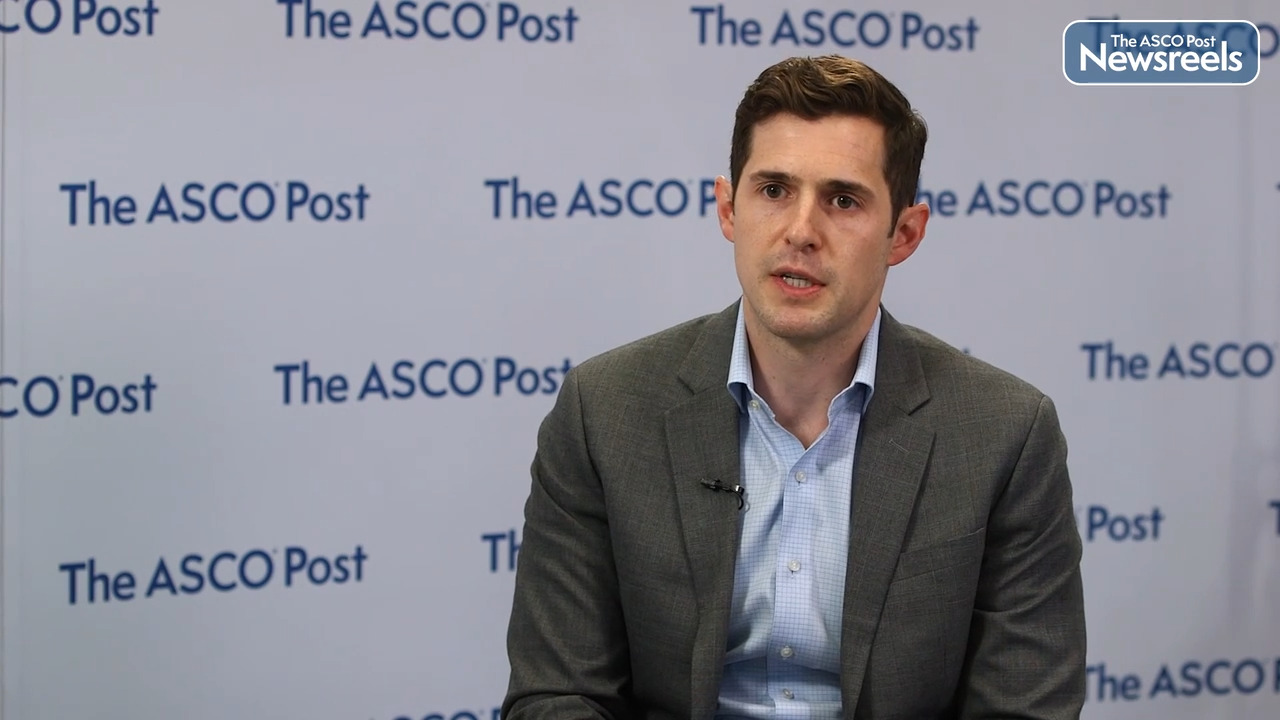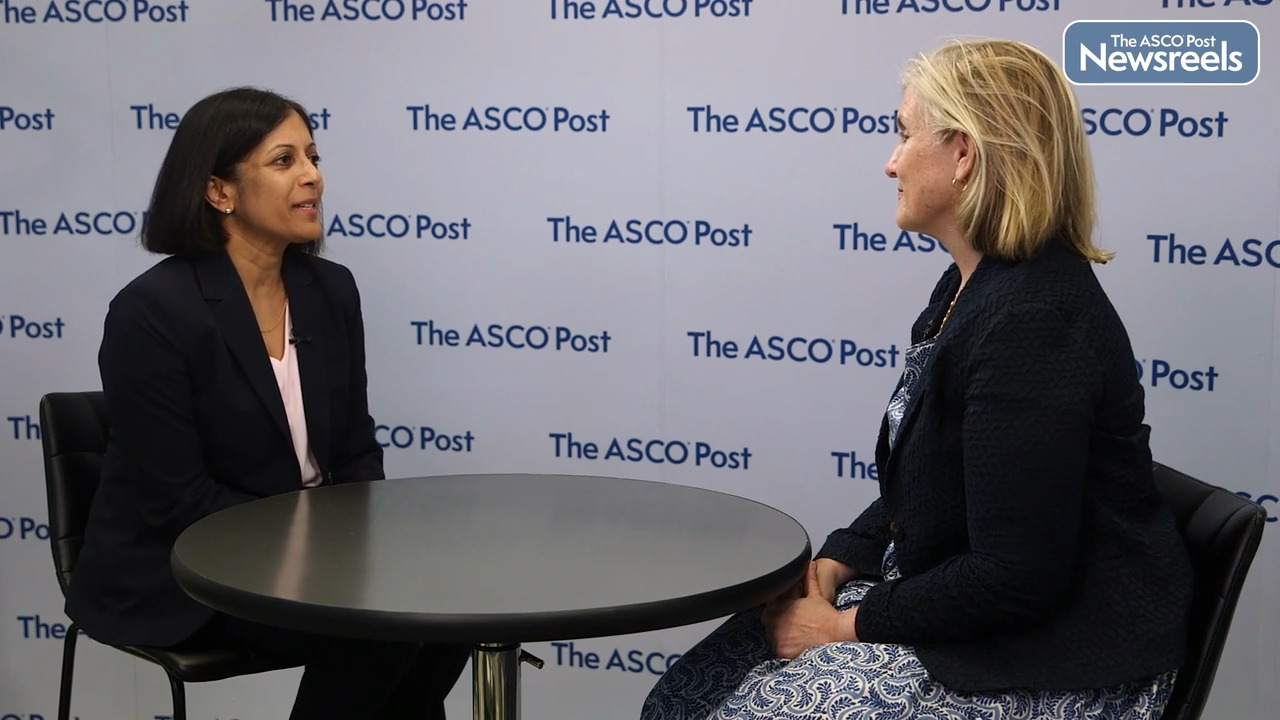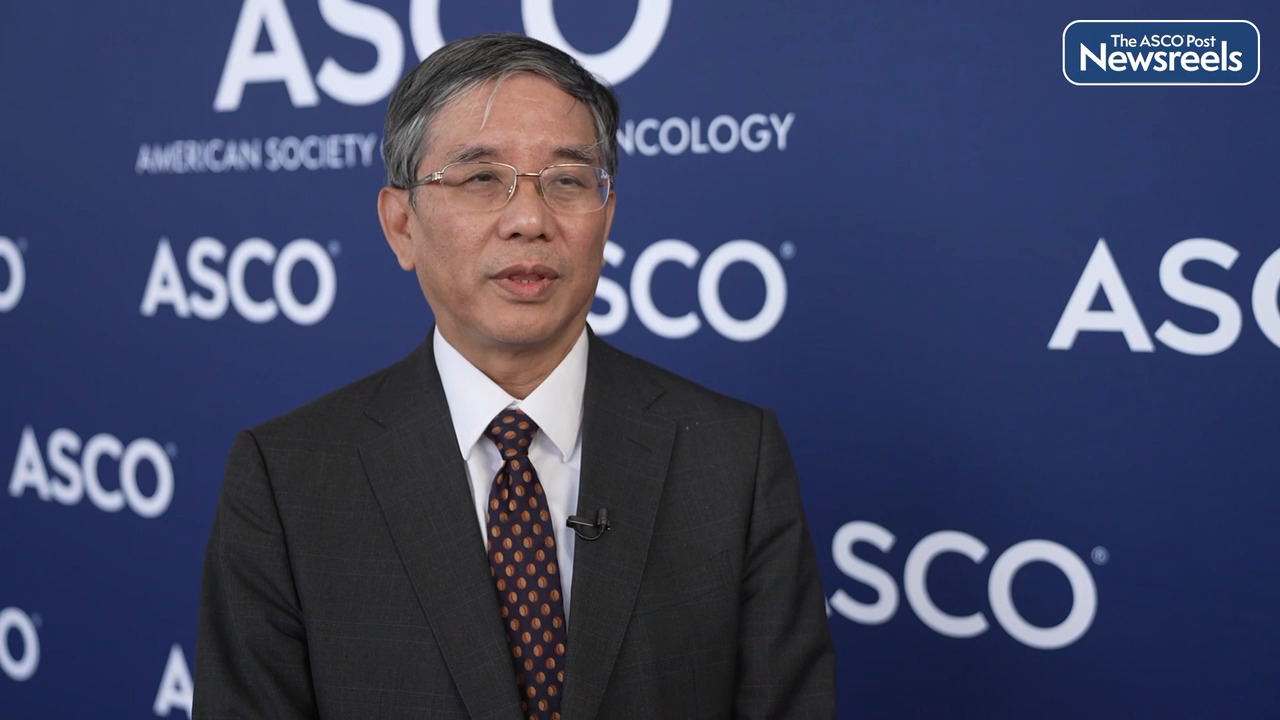Transcript
Disclaimer: This video transcript has not been proofread or edited and may contain errors.
Allison Betof Warner, MD, PhD:
Can you tell me a little bit about why you did this study and the background?
Zeynep Eroglu, MD:
Yeah. Thank you for having me. So we know that in the present era of treatment for metastatic melanoma, BRAF-targeted therapy drugs are now mostly used in the post-immunotherapy setting for patients whose melanoma has a BRAF V600 mutation. And we know from the initial studies of BRAF inhibitors such as dabrafenib, trametinib, they've typically shown tumor response rates around 70%, complete response rates 10 to 15%, with median progression-free survival around a year. But longer follow-up from targeted therapy studies have shown five-year progression-free survival rates around 20%, so there's still a subset of patients who can have prolonged benefit from BRAF-targeted therapy. So given the limited options for patients with metastatic melanoma after failure of immunotherapy, we think that attempting to improve outcomes with BRAF-targeted therapy may still be worthwhile. So that's why we wanted to explore the idea of combining targeting apoptosis with BRAF MEK inhibitors and see if we can lead to any improved outcomes in patients with melanoma.
Allison Betof Warner, MD, PhD:
Really cool concept. Why navitoclax in particular, and why targeting apoptosis specifically?
Zeynep Eroglu, MD:
Yeah, so we've seen that there's high levels of the anti-apoptotic BCL-2 proteins in melanoma that can lead to worse outcomes when treated with BRAF-targeted therapy. So this can essentially be a mechanism of resistance to BRAF MEK inhibitors. So BRAF-targeted therapy drugs can lead to death of cancer cells by upregulating pro-apoptotic proteins like BIM, but can also increase anti-apoptotic BCL-2 family member proteins.
So overall, unfortunately the pro-apoptotic activity of BRAF MEK inhibitors is fairly modest overall. So the idea is we could enhance outcomes by adding a drug that could lower the threshold for apoptosis induction. So one such drug is navitoclax, which is an inhibitor of the BCL-2 family member proteins. And it's actually been shown in animal models, when combined with BRAF MEK inhibitors, to lead to increased apoptosis, increased tumor shrinkage, improved prolonged survival compared to BRAF and MEK inhibitors alone. So we thought that this would be worth looking further in a clinical trial.
Allison Betof Warner, MD, PhD:
Great. So this was the phase II trial. I'm presuming that was started with a phase II that established this dose?
Zeynep Eroglu, MD:
Correct. So the phase I trial of dabrafenib, trametinib and navitoclax was in patients with all solid tumors and had a BRAF mutation. That study had 20 patients who got the triplet regimen, and 10 of those patients had metastatic melanoma. Essentially established the recommended phase II dose with the standard doses of dabrafenib trametinib with 225 milligrams of navitoclax daily with a one-week lead-in of navitoclax prior to the starting of the triplet regimen.
Allison Betof Warner, MD, PhD:
And why the lead-in with navitoclax?
Zeynep Eroglu, MD:
That's a good question. So the drug has been shown to cause thrombocytopenia when given in combination, so that's why it's given on its own for one week as a lead-in before the start of the combination regimen. So that was the reason.
Allison Betof Warner, MD, PhD:
Got it. So the phase II study design was randomized versus dabrafenib trametinib. Can you tell us a little bit more about the study design?
Zeynep Eroglu, MD:
Yeah. So essentially, we were looking to enroll 50 patients with BRAF V600 mutants and resectable or metastatic melanoma, could've received any prior line of therapy, including immunotherapy, except for BRAF inhibitor therapy. They were randomized one to one to the triple regimen, dabrafenib, trametinib, navitoclax, with the dose discernment from the phase I study versus the standard dose of dabrafenib trametinib. They were also stratified by tumor burden, more than or less than a hundred millimeters of tumor burden.
Allison Betof Warner, MD, PhD:
Great. And what'd you find?
Zeynep Eroglu, MD:
So the study had two primary endpoints. The first was to estimate the complete response rate of the triplet regimen, dabrafenib, trametinib, and navitoclax, compared to historical controls. So essentially, the design was looking at comparing a 10% complete response rate to 30% complete response rate. So we found that of the 25 patients who received the triplet regimen, five of the 25 had a complete response. So that actually met that primary endpoint. Objective response rate was 84%. Dabrafenib trametinib alone, complete response rate was still high at 16%.
The second primary endpoint was actually comparing the maximal tumor regression, so essentially the AUC of the waterfall plots between the triplet arm versus dabrafenib trametinib. The maximal tumor regression was 68% with the triplet, 63% with the doublet. So that actually was not a statistically significant difference, so the study didn't meet that particular endpoint.
Allison Betof Warner, MD, PhD:
Okay. And how about progression-free survival as an endpoint there?
Zeynep Eroglu, MD:
Yeah, so those were the secondary objectives of the study. So progression-free survival was actually similar in both arms. It was actually quite high, 21 months, even with dabrafenib trametinib. So actually quite a bit higher than usually around 12 months that we see with BRAF MEK inhibitors alone.
And then with overall survival, we found for the entire cohort of 50 patients, it was 36 months. And then looking at the two cohorts separately with dabrafenib, trametinib, navitoclax, the two-year survival rates was 74% versus 57% with the dabrafenib and trametinib alone. If we looked at, as the study was stratified based on tumor burden, at the 37 patients who had the lower tumor burden, the two-year survival rate was 80% with the triplet arm versus 59% with the doublet arm. We are planning to follow these patients longer for survival.
Allison Betof Warner, MD, PhD:
Sure. And how about the tox of the triplet combination?
Zeynep Eroglu, MD:
That's a good question. So there was only two patients in each arm, each cohort of 25 patients, who actually had to stop for side effects. So there was some expected additive toxicity with the triplet, mostly some hematologic toxicities attributed to navitoclax such as thrombocytopenia, ANC decrease, but most of these were not grade 3 events. So I would say overall, it seemed to be fairly well tolerated.
Allison Betof Warner, MD, PhD:
Great. So given you met some of your primary endpoints and not the others, where do you see this going? What's the future of this combination?
Zeynep Eroglu, MD:
Yeah, so I think it's going to be important to look at the correlative analyses, so [inaudible 00:07:08] serial blood samples, tumor samples collected from the patients. So some of the ongoing analysis are RNA-seq, some sequencing, proteomics, looking at BCL-2 family member analysis. So we're thinking that results of correlative studies may help to inform any future study designs with regards to potentially looking at this triplet regimen in the post-immunotherapy refractory setting for metastatic melanoma.
Allison Betof Warner, MD, PhD:
Thank you so much. I really appreciate your time, and really excited to hear more about the combination.
Zeynep Eroglu, MD:
Thank you.
